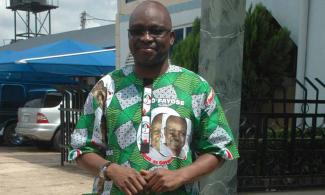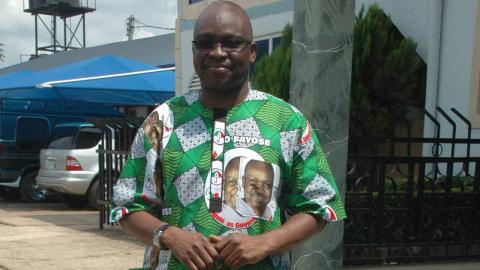
Thus, there is no better time than now to assess the performance of incumbent governor of Ekiti, Peter Ayodele Fayose since he assumed the leadership of the state on October 16, 2014

Since 1999 when this latest democratic experiment started we have yet to codify and institutionalize solid key performance metrics and indicators to evaluate and measure the performance or non-performance of an elected official for the period which he was empowered with state funds and all the paraphernalia of state. Beyond tokenistic actions, what particular parameters suggest that an elected officer has performed satisfactory or otherwise? There is no statutory or even empirical procedure to measure the steward, if he/she ever cared to render an account of stewardship.
Most often than not, the last year for tenured political office holders is usually used to secure a loyal replacement while trying to also imprint a legacy in the heart of the people. The replacement who is tagged “continuity”, most often than not is a shield to block the shenanigans perpetrated by the incumbent. Thus, there is no better time than now to assess the performance of incumbent governor of Ekiti, Peter Ayodele Fayose since he assumed the leadership of the state on October 16, 2014.
When the herdsmen and farmers clash reared its ugly head in the North and was gradually coming South, Ekiti state was the first in the country to legislate against open grazing. Signing the bill titled Prohibition of Cattle and other Ruminants Grazing in Ekiti, 2016, Fayose blazed the trail. The law which was necessitated by the exigency of that period helped to stem the tide of wanton destruction of farmlands and farmers by herdsmen whose tendency was becoming a national malaise at the time.
The results of the Senior Secondary School examination conducted by the National Examinations Council (NECO) released in 2016 and 2017 rated Ekiti state as the best in the country. Rising from 34th position in 2014, Ekiti state emerged first among the 36 states and Federal capital in 2016, a feat that was repeated in 2017. According to Mr Jide Egunjobi, the Commissioner for Education, one of the radical measures that guaranteed the result was the cancellation of free WAEC and NECO registration fee for students. The measure, though painful, he reasoned, was yielding desired results.
It is also to the credit of this government that the very first flyover bridge in the whole of Ekiti state was constructed by this administration. Although critics posit that the bridge was needless and wasteful, Fayose insists that the purpose of the bridge would become evident in the years to come as commercial activities improve in Ado Ekiti. The bridge covering a distance of about 1km and constructed at a whooping sum of over N15 billion, many have maintained, is a sheer waste of scarce resources and misplacement of priority, especially at a time when the government has inherited and accumulated debts. This, they argue contradicts his interest in the welfare of the state as a whole. The project when compared with Ondo state’s N19.3 billion coastline road project covering 51km linking Lagos and Ondo states, which was flagged off recently, Fayose’s bridge is a rip-off.
Also since his assumption to office as the elected governor of Ekiti state, Mr Peter Ayodele Fayose has left no one in doubt of his tight fist to power and the fiefdom of Ekiti state. His utterances have been unbecoming of a governor who should symbolise finesse and a model worthy of emulation. Even his commissioners are mere decorative executive members who may be able to bark but cannot bite.
Fayose’s ambition was never born out of vision to improve the welfare of the people of Ekiti. His mission was clear: wrestle power in order to deliver Ekiti to his principal, Goodluck Jonathan in the build-up to the 2015 presidential elections. Like many politicians of his ilk, he had neither plan nor will to better the lot of the downtrodden of Ekiti populace. His ambition was aroused out of the desire to take his pound of flesh following his ouster from office in 2006 and to become a principality in the largely agrarian community. And this he has achieved to a great extent.
Since he wrested power, a lot has changed, yet so much has got worse. He promised a better life, a better future. But the more things changed, the more they remain the same. Rather than cure, his political diagnoses and interventions have further impoverished Ekiti state. In spite of his lone opposition to the federal government, the state’s statutory fiscal allocations including first and second bail out, Ecological fund and Paris club refund, Federal road refund, among others, have been duly paid by the federal government. Till date, the state government is yet to account for the state’s internally generated fund. Since the ouster of his predecessor, record of the state’s internally generated revenue has been shrouded in utmost secrecy despite the increase in tuition of the state’s owned tertiary institution.
Ekiti state’s foremost tourist attraction, the Ikogosi warm spring, was said to be generating a lot of revenue just before Mr. Governor took over. But this is no longer the story. Information from the locals in Ikogosi-Ekiti, where the spring is situated, has it that all the furniture and equipments put in place by Dr. Kayode Fayemi were carted away one fateful night, loaded on a truck while the truck driver zoomed away. Till date no one can say on whose authority this was done or where these were taken to, but this government never declared anything missing.
The governor is usually quick to blame his inability to pay workers’ salary on the dwindling federal allocation and the dwindling economy. It however remains a paradox how the government raises money to finance projects, pull down buildings and compensate their owners. The insincerity of the government in compensating some of those whose properties were affected in the course of road construction is on the lips of every Tom, Dick and Harry in Ado-Ekiti.
Part of his social and economic pain to the state is his refusal to be a part of the Feed a child project of the federal government. Till date, Ekiti is yet to gain from this initiative. His high handedness and anti-Buhari stance has been more of a curse than blessing to the state.
Whatever problem he met at the time has got worse. Ripping the workers of their hard-earned wages is wickedness. Civil servants were being held three months salary on his ascension to power. Today, civil servants, local government staff and pensioners are being owed not less than seven months. They are groaning under the yoke of the government’s insensitivity to their plight.
Clearly the lowest point in this administration is the reduction of the average Ekiti man to a poverty mentality. His pioneer lexicon, stomach infrastructure is a descent from decency. It was simply a debasement of the human dignity. For the acceptance of this anomaly has encouraged this administration’s squander mania and eroded significant development in the last four years.